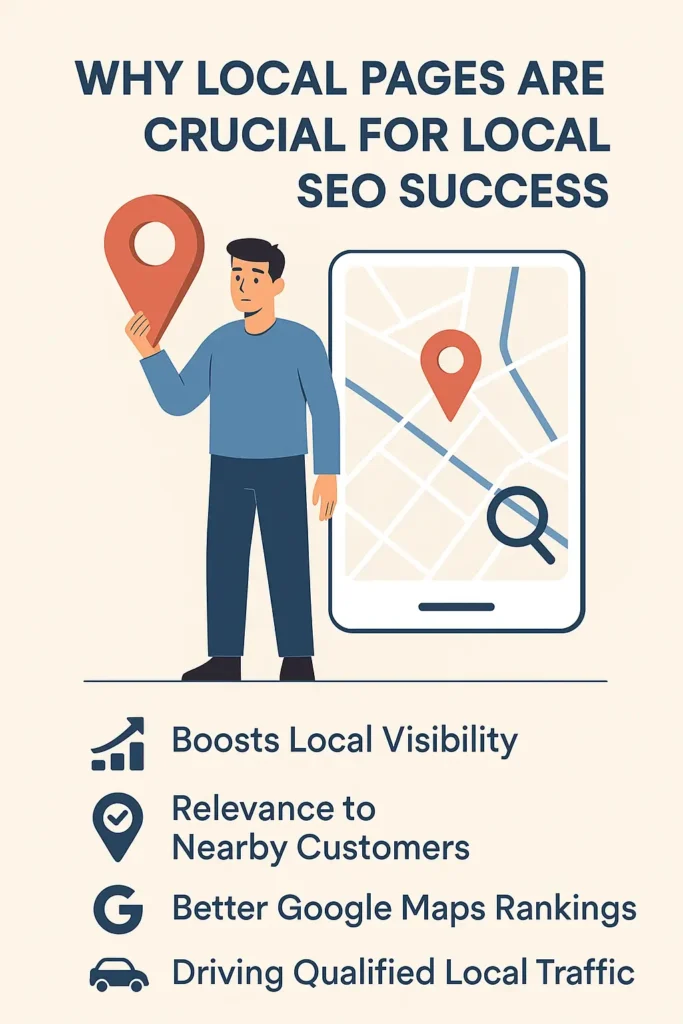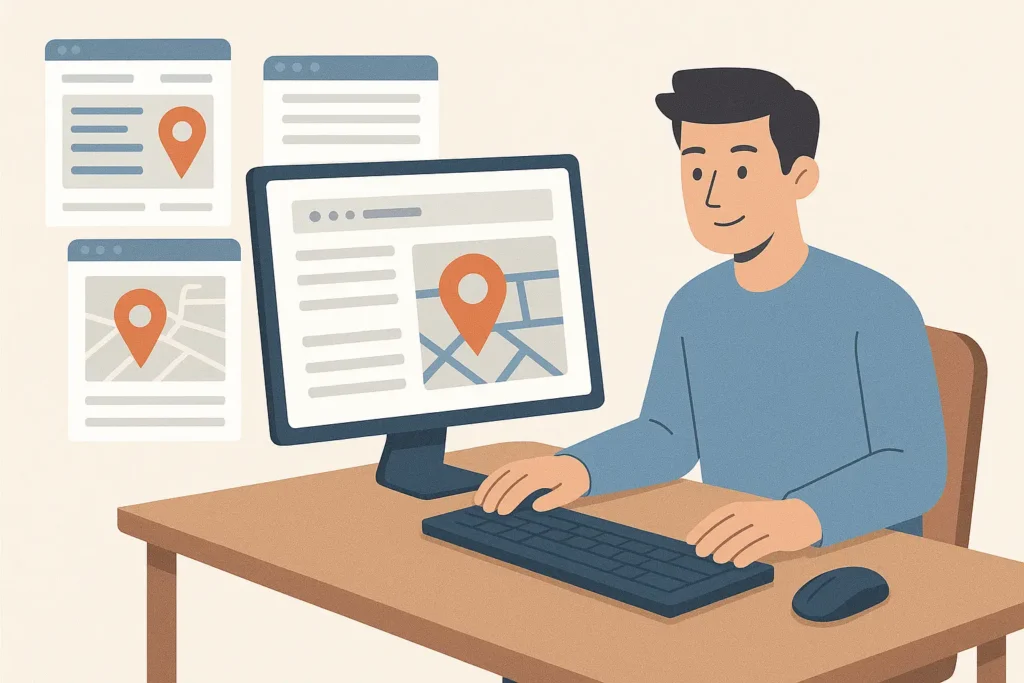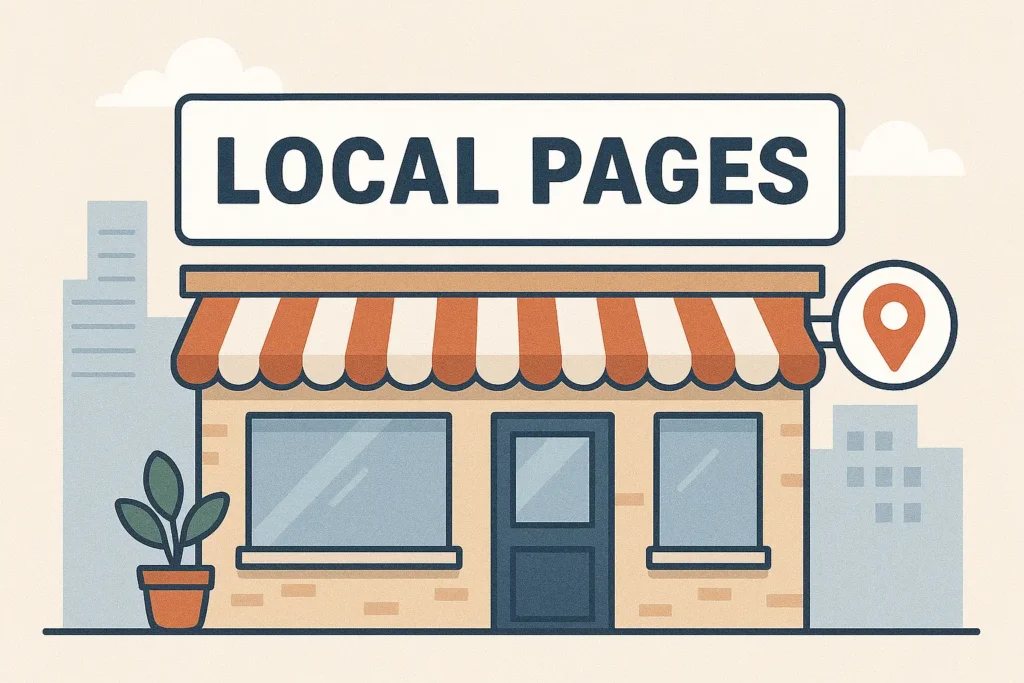Local pages aren’t just nice to have—they’re the secret weapon of local SEO. By focusing on your neighborhoods, communities, and cities with hyper-relevant content, you’ll stand out in searches, connect with local customers, and dominate your market.
What Are Local Pages?
Local pages are specific web pages created for each location your business serves. If you own a chain of bakeries or provide services in multiple cities, each city or neighborhood should ideally have its own dedicated landing page.
These pages aren’t just copies with a different city name—they’re personalized, relevant, and optimized for local intent.
Key Features of Local Pages
- City-Specific Content – Tailored to the unique needs and language of each location.
- NAP Information – Includes the business’s Name, Address, and Phone number.
- Embedded Maps – Usually includes a Google Maps location for easy navigation.
- Customer Testimonials – Featuring reviews from clients in that area.
- Local Business Hours – Shows exact opening times, especially useful if they vary by location.
Differences Between Local Pages and General Landing Pages
| Feature | Local Pages | General Landing Pages |
|---|---|---|
| Target Audience | Local residents | General/nationwide audience |
| Keywords Used | Location-specific | Broad, non-location |
| Content Style | Personalized, niche | Generic, wide-reaching |
| SEO Focus | Local rankings | General SEO authority |

The Role of Local Pages in Local SEO
Creating dedicated local pages is like putting your flag down in each neighborhood you want to dominate. These pages tell Google, “Hey! We serve this area—and here’s how!”
How They Boost Local Visibility
Local pages ensure you’re showing up when users search for terms like:
- “Plumber in Brooklyn”
- “Best pizza in San Diego”
- “Yoga classes near me”
The more specific and helpful your local page, the better your chances of being featured in local packs, maps, and voice searches.

Relevance to Nearby Customers
Local customers are looking for businesses that are:
- Nearby
- Open now
- Trusted by other locals
Local pages help fulfill all three needs with localized content, trust signals, and real-time info like hours and services.
SEO Benefits of Creating Local Pages
Better Google Maps Rankings
Google uses your local page content to determine whether you deserve a spot in the “Map Pack.” This is the trio of listings that show up with a map, and it’s SEO gold for small businesses.
Enhanced Organic Search Results
Well-optimized local pages rank not only on the map but also in regular search results. This dual exposure gives your brand extra visibility.
Driving Qualified Local Traffic
When you create a local page for “Dog Grooming in Austin,” you’re likely to attract pet owners from Austin—not someone across the country who can’t use your services.
Real-World Examples of Effective Local Pages
Local Business Use Cases
- A law firm with offices in five cities creates a separate landing page for each city with lawyer bios, court proximity, and client reviews.
- A dentist highlights location-specific promotions for each clinic.
Industry-Specific Applications
- Restaurants – Menu variations based on region
- Healthcare – Doctor listings and patient reviews by location
- Retail – Inventory differences, store events

How to Create SEO-Friendly Local Pages
Step-by-Step Content Checklist
- Include the city name in your title tag and headers
- Use unique content for each location
- Add a map and NAP details
- Feature local testimonials
- Use location-specific images
Optimizing for Local Keywords
Use keywords like:
- “[Service] in [City]”
- “Best [Service] near me”
- “[City] [Product/Service] specialists”
Schema Markup and NAP Info
Local Business Schema helps search engines understand your business. Add it using JSON-LD format and keep NAP info consistent across platforms.
Common Mistakes to Avoid with Local Pages
Duplicate Content
Don’t just copy-paste content and switch city names. Google may consider it thin or spammy.
Missing Location-Specific Details
If your “Chicago” page doesn’t mention Chicago-specific services, events, or reviews, it won’t feel authentic.
Ignoring Mobile Optimization
Most local searches happen on mobile. Your local page must load fast and be easy to navigate.
Tools to Help You Manage Local SEO Pages
Google Business Profile
It connects directly with your local pages and boosts visibility. Make sure every local page links to the right profile.
Local SEO Audit Tools
Use tools like:
These tools audit citations, backlinks, and NAP consistency across the web.
How Local Pages Help You Stand Out from Competitors
Creating a Hyperlocal Connection
By speaking directly to each community’s needs, you become more than just a service provider—you become a neighbor.
Building Trust Within the Community
When customers see familiar landmarks, local testimonials, and tailored offers, they’re more likely to choose your business over a faceless competitor.
Mobile Optimization for Local Pages
Importance of Speed and Accessibility
A good local page:
- Loads in under 2 seconds
- Has clickable phone numbers
- Uses responsive design for all devices
The Future of Local Pages in SEO
AI and Personalization in Local SEO
Expect more AI-driven experiences in search results, including smart snippets, conversational search, and predictive local recommendations. Local pages must stay flexible and relevant to stay on top.
FAQs About Local SEO and Local Pages
What makes a good local page?
A strong local page has unique content, a clear call to action, NAP info, and location-based keywords.
How many local pages should a business have?
One per location is ideal. If you serve 10 cities, make 10 pages.
Do local pages affect my map pack ranking?
Yes. Google evaluates your relevance and authority based on your local content and schema.
How do I track local page performance?
Use Google Search Console, Google Analytics, and UTM tracking to monitor visits, calls, and clicks.
Can I use the same content across multiple locations?
Avoid it. Duplicate content can hurt rankings. Customize each page with local insights and examples.
Should I build a local page for each service area?
If they’re high-value areas, yes! Focus on unique, helpful content for each one.
Conclusion: Think Local, Rank Higher
Local pages aren’t just nice to have—they’re the secret weapon of local SEO. By focusing on your neighborhoods, communities, and cities with hyper-relevant content, you’ll stand out in searches, connect with local customers, and dominate your market.
Whether you’re a solo entrepreneur or a multi-location brand, the path to better rankings and higher conversions begins right in your own backyard.
